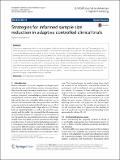Files in this item
Strategies for informed sample size reduction in adaptive controlled clinical trials
Item metadata
| dc.contributor.author | Arandelovic, Ognjen | |
| dc.date.accessioned | 2017-10-31T17:30:06Z | |
| dc.date.available | 2017-10-31T17:30:06Z | |
| dc.date.issued | 2017-10-30 | |
| dc.identifier | 251331625 | |
| dc.identifier | 515392e4-31d1-4f60-8b00-d9c321066848 | |
| dc.identifier | 85032570655 | |
| dc.identifier | 000414358700001 | |
| dc.identifier.citation | Arandelovic , O 2017 , ' Strategies for informed sample size reduction in adaptive controlled clinical trials ' , EURASIP Journal on Advances in Signal Processing . https://doi.org/10.1186/s13634-017-0510-z | en |
| dc.identifier.issn | 1687-6180 | |
| dc.identifier.other | ORCID: /0000-0002-9314-194X/work/164895884 | |
| dc.identifier.uri | https://hdl.handle.net/10023/11974 | |
| dc.description | Special issue on Biomedical Informatics with Optimization and Machine Learning | en |
| dc.description.abstract | Clinical trial adaptation refers to any adjustment of the trial protocol after the onset of the trial. The main goal is to make the process of introducing new medical interventions to patients more efficient. The principal challenge, which is an outstanding research problem, is to be found in the question of how adaptation should be performed so as to minimize the chance of distorting the outcome of the trial. In this paper, we propose a novel method for achieving this. Unlike most of the previously published work, our approach focuses on trial adaptation by sample size adjustment, i.e. by reducing the number of trial participants in a statistically informed manner. Our key idea is to select the sample subset for removal in a manner which minimizes the associated loss of information. We formalize this notion and describe three algorithms which approach the problem in different ways, respectively, using (i) repeated random draws, (ii) a genetic algorithm, and (iii) what we term pair-wise sample compatibilities. Experiments on simulated data demonstrate the effectiveness of all three approaches, with a consistently superior performance exhibited by the pair-wise sample compatibilities-based method. | |
| dc.format.extent | 9 | |
| dc.format.extent | 916256 | |
| dc.language.iso | eng | |
| dc.relation.ispartof | EURASIP Journal on Advances in Signal Processing | en |
| dc.subject | RCT | en |
| dc.subject | Bayesian | en |
| dc.subject | Information | en |
| dc.subject | QA75 Electronic computers. Computer science | en |
| dc.subject | RM Therapeutics. Pharmacology | en |
| dc.subject | T-NDAS | en |
| dc.subject.lcc | QA75 | en |
| dc.subject.lcc | RM | en |
| dc.title | Strategies for informed sample size reduction in adaptive controlled clinical trials | en |
| dc.type | Journal article | en |
| dc.contributor.institution | University of St Andrews. School of Computer Science | en |
| dc.identifier.doi | 10.1186/s13634-017-0510-z | |
| dc.description.status | Peer reviewed | en |
This item appears in the following Collection(s)
Items in the St Andrews Research Repository are protected by copyright, with all rights reserved, unless otherwise indicated.

